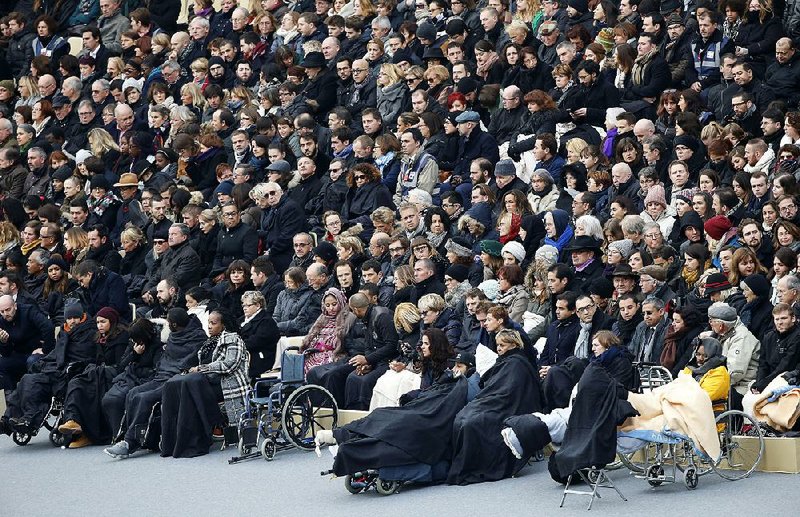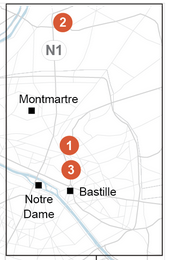PARIS -- France paid homage Friday to the 130 killed during attacks two weeks ago in Paris, honoring each by name.
At the ceremony at Les Invalides national monument, French President Francois Hollande noted that most of the victims were younger than 35, killed while enjoying a Friday night of music, food, drinks or sports. The youngest was 17. The oldest, 68.
Meanwhile, in Belgium, authorities charged a man with "terrorist attacks" as investigators worked to home in on culprits.
The federal prosecutor's office said the man was arrested a day earlier in Brussels and was "charged with terrorist attacks and taking part in the activities of a terrorist group." He was not identified and it was not immediately clear if he was one of two fugitives authorities have been seeking.
Throughout Paris, French flags fluttered in windows and on buses in displays of patriotism in response to Paris' second deadly terror attack this year.
But the mood was grim at the locked-down ceremony at Les Invalides.
Hollande, who in January locked arms with world leaders in a show of global unity against terrorism after shootings at a satirical publication and a Jewish market, sat alone in a hard-backed chair in the cavernous Invalides courtyard, the assembled mourners behind him as victims' names were recited. France's military provided the only images of Friday's ceremony, and no one without an invitation was permitted inside.
Addressing the crowd, Hollande said that the 130 victims of the terrorist attacks of Nov. 13 represented "130 laughs that we won't hear anymore, 130 voices that went quiet forever."
"These women, these men, embodied the happiness of life,"Hollande continued. "They were killed because they were life, they were shot down because they were France, they were slain because they were freedom."
The names included Manuel Colaco Dias, 63, a retired chauffeur and avid soccer enthusiast; Matthieu Giroud, a professor of geography at the University of Marne-la-Vallee, who had a 3-year-old son, Gary, and a girl expected in March; Nohemi Gonzalez, 23, a vivacious first-generation Mexican-American from California, who was studying industrial design; and Hodda Saadi, 35, a yoga-loving French restaurant manager with Tunisian roots.
The courtyard observed a minute of silence after the reading of the names finished, broken by a mournful cello. Hollande stared straight ahead, before finally rising to speak.
"To all of you, I solemnly promise that France will do everything to destroy the army of fanatics who committed these crimes," Hollande said.
The speech was dedicated above all to the dead and France's young.
"The ordeal has scarred us all, but it will make us stronger. I have confidence in the generation to come. Generations before have also had their identity forged in the flower of youth. The attack of Nov. 13 will remain in the memory of today's youth as a terrible initiation in the hardness of the world. But also as an invitation to combat it by creating a new commitment," he said.
The night of Nov. 13, three teams of suicide bombers and gunmen struck across Paris, beginning at the national stadium -- where Hollande was among the spectators -- and ending in the storming of the Bataclan concert hall. In all, 130 people died and hundreds were injured. The crowd at the stadium shakily sang France's national anthem as people filed outside that night; a military band played the Marseillaise again Friday, lingering slightly on the refrain: "Aux armes, citoyens! (to arms, citizens!)"
Hollande noted that many of the dead, especially those at the Eagles of Death Metal show at the Bataclan, had careers in music -- a music he said the attackers found intolerable.
"It was this harmony that they wanted to break, shatter. It was this joy that they wanted to bury with the blast of their bombs. Well, they will not stop it. We will multiply the songs, the concerts, the shows. We will keep going to the stadiums, and especially our beloved national stadium in Saint-Denis. We will participate in sports gatherings great and small," Hollande said.
"And we will commune in the best of emotions, without being troubled by our differences, our origins, our colors, our convictions, our beliefs, our religions. Because we are a single and unified nation, with the same values."
Hollande vowed that the country would do everything in its power to destroy "this army of fanatics" and protect its children, adding that France would not shy from holding concerts and sporting events.
"We know the enemy, it is hate, which kills in Bamako, in Tunis, in Palmyra, in Copenhagen, in Paris and has killed in the past in London or Madrid," he said.
Hollande also paid tribute to the people wounded during the attacks, and called for the French to embrace hope.
The terrorists "have a cult of death," he said. "But we have a love of life."
Hollande's voice and the music were the only sounds inside the Invalides, filled by hundreds of people. At least 10 survivors in wheelchairs lined up in front of the stands in the open-air courtyard, which was packed with the families of victims and of those wounded.
"The emotion was reflected mostly by silence from the beginning to the end of the ceremony," said Catherine Orsenne, who was injured in the bombings outside the stadium. "The silence was everywhere and you could hear a pin drop."
Hollande imposed a national state of emergency hours after the attacks, allowing extrajudicial powers including searches without warrants and house arrest. The government said it was temporarily pulling out of the European Convention on Human Rights, and some activists have expressed concerns about indiscriminate police roundups.
Paris' administrative court ruled against two men Friday -- one of whom was convicted of sending jihadists to Mali -- who had contested their house arrest. Both are linked to past and present radical activities.
Two named fugitives are wanted in connection with the Nov. 13 attacks -- Salah Abdeslam, whose brother was among the suicide bombers and who is believed to have fled for Belgium that night, and Mohamed Abrini, whose role has never been made clear.
Seven attackers died Nov. 13. Five days later, the Belgian suspected of planning the attacks, his female cousin and another unidentified man were killed in a police raid near the national stadium. The Paris prosecutor said the mastermind, Abdelhamid Abaaoud, planned another imminent suicide attack in the city's main business district.
Information for this article was contributed by Lori Hinnant, Lorne Cook, Philippe Sotto and Nicolas Garriga of The Associated Press and by Dan Bilefsky, Liz Alderman, Lilia Blaise and Elian Peltier of The New York Times.
A Section on 11/28/2015

